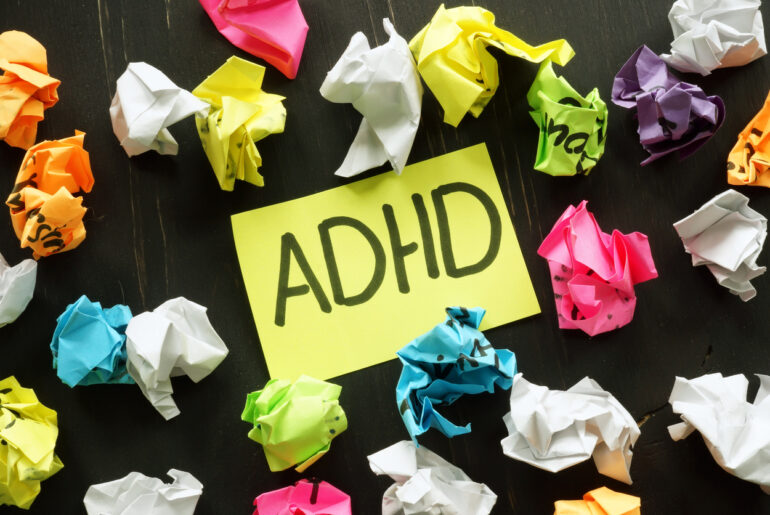Returning to school as an adult learner often feels like a balancing act. Making time to study while juggling a family and a job is challenging, often requiring strong time management skills and the ability to focus for prolonged periods of time. But when a learning disability like Attention Deficit Hyperactivity Disorder (ADHD) is added to the mix, the idea of returning to school can change from challenging, to downright stressful.
According to diagnostic interview data collected by the National Comorbidity Survey Replication (NCS-R), 4.5 percent of U.S. adults between the ages of 18 and 44 have been diagnosed with ADHD. We know students have questions around the topic, so we decided to speak with a medical professional who could help break down what ADHD is, how it affects students, and helpful strategies for successful learning with ADHD.
What is ADHD?
We spoke with Jess Farrar, Ph.D., a licensed psychologist for the University Neuropsychiatric Institute – YA CAT Program at the University of Utah to provide us with the medical definition of ADHD.
“According to the Diagnostic and Statistical Manual of Mental Disorders (DSM-5) published by the American Psychiatric Association, ADHD is defined as ‘a persistent pattern of inattention and/or hyperactivity-impulsivity that interferes with functioning or development.’ ADHD can be diagnosed through a psychological assessment, with the goal of analyzing which aspects of a person’s functional impairment can be attributed to symptoms consistent with ADHD and rule out if there are other contributing factors, like Post Traumatic Stress Disorder (PTSD) for example,” said Farrar.
Farrar shared with us that a clinical interview and neuropsychological testing conducted by a medical professional may be used to help diagnose ADHD.
“It’s also important to keep in mind that at least one-third of individuals with ADHD also experience co-occurring mental health conditions, such as anxiety, mood disorders, problems with sleep, or learning disabilities.”
ADHD doesn’t just affect children
Many adults living with ADHD are unaware they have it. They may be aware they have a hard time concentrating or controlling impulses, but they may not realize there are options available to help them succeed in college.
“Although this disorder originates in childhood, it is chronic and persists throughout a person’s life. While many individuals are diagnosed as children or adolescents, it is not uncommon for it to remain undiagnosed into adulthood.”
In an effort to help adult learners with ADHD navigate a successful return to college, we spoke with Farrar to understand what the disorder is and provide a few tips for success.
How ADHD affects students
Students with ADHD may experience different challenges than their classmates. While there isn’t a “one-size fits all” list of symptoms, Fararr suggested students with ADHD may have difficulty with time management skills, staying organized, and following through on tasks or assignments.
“Symptoms of ADHD typically impact functioning in the following areas: cognitive, academic, behavioral, emotional, and social. Common symptoms include:
- Impulsivity
- Restlessness
- Difficulty modulating attention
- Hyperactivity
Neurocognitive deficits may also be a factor, which include sustained attention, vigilance, executive functioning, self-regulation, and working memory.”
Farrar further explained that children with ADHD may behave differently than adults with the same condition. For example, you may describe a child with ADHD as being overactive, but describe an adult as a procrastinator or as being distracted.
Outside of the classroom, Farrer explained that adults with ADHD are more likely to get into minor traffic accidents due to an inability to focus.
Strategies for success
Implementing basic lifestyle practices, like removing distractions and becoming strategic with your time, can help keep students affected by ADHD on track. We asked Farrar to provide a few examples of strategies for success for home and school.
At home:
“Break your workload into smaller chunks and be intentional about scheduling breaks. Try working in 25-minute increments followed by either a five or ten-minute break. During your break, make notes of what you’ve accomplished. It will combat the feeling that you didn’t get enough done and allow you to chart the mastery of the task.”
There are also non-clinical interventions, like practicing mindfulness, establishing a regular sleep schedule, and getting exercise that can help to mitigate the symptoms of ADHD.
On campus:
Don’t be afraid to request academic accommodations. Procedures will vary by school, so check with your academic advisor or university testing center about required documentation. Accommodations may include extra time for exams or a different format for reading material, among other things.
“The University of Utah’s Center for Disability and Access is available for students to seek out if they need help advocating for modifications to course work and provide resources to help them navigate classes.”
Under the supervision of a medical professional:
The use of medication and/or psychotherapy can help students improve their concentration while reducing impulsive tendencies.
“Psychotherapy is helpful, not only in addressing the specific symptoms associated with ADHD, but also for co-occurring disorders, like anxiety, mood disorders, substance abuse, etc. Those can make ADHD symptoms worse, or conversely, ADHD symptoms could make anxiety or depression worse.”
When to seek help
“Students should seek help when they experience distress related with impairments in their ability to function. Basically, if you’re not experiencing any difficulties, then no need for seeking help. If you are, then it’s a good idea to talk to a professional so that you can start to dig into what might be causing your difficulties. Even if it’s not ADHD, something is obviously going on that’s causing a problem, so identifying and addressing that is extremely important.”
Farrar stressed that even medical assessments that don’t result in an ADHD diagnosis can be helpful to students.
“If a student seeks help and goes through the diagnostic process, they may find out that ADHD is not the correct diagnosis. But through that process they may learn about other things that may be causing impairments, and gain the tools to solve the problem.”
Having experienced challenges to overcome in the past doesn’t mean you can’t be a successful student today. Being proactive and identifying strategies to keep yourself motivated and focused can only help in easing the transition back into life as a student.
Need help finding a college with resources for learners with ADHD? Check out our list of 20 Great Colleges for Students with Learning Disabilities. Looking for other resources geared specifically toward adult learners? Check out Peterson’s Adult Learner Resource Center.



